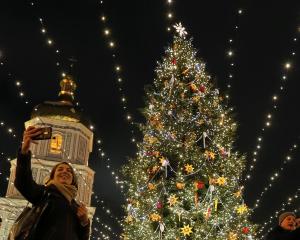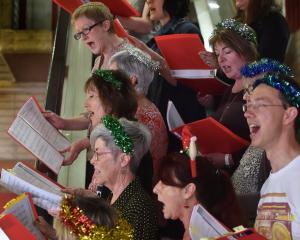One of the latter is Cadbury, where each of the company's 850 New Zealand employees receives a $35 voucher which can be spent on products of their choice from the staff shop, corporate affairs manager Aimee Driscoll said.
The recession had not brought any change to this, which she described as "a long-standing arrangement".
The cash-strapped Southern District Health Board, which has more than 4000 staff, is among employers where frugality is being practised.
This year, in Otago, it expects to spend about $5700 on morning-tea platters, compared with seven years ago when it used to spend about $30,000 giving all staff boxes of chocolates.
Otago chief operating officer Vivian Blake said this practice was changed five years ago to a staff barbecue, which cost about $15,000.
Last year, staff were each given a packet of home-made shortbread, costing $6212.50 (plus the cost of packaging).
Emergency medicine and surgery group manager Dr Colleen Coop said it was hoped that in most areas the Christmas morning-tea platter, which was not a luxurious offering, would be shared socially, but in areas where it was difficult to co-ordinate, staff might choose to divide it into small lots for individuals.
In Southland, the board is continuing the practice of providing Christmas cake for shared morning tea at a cost of between $3000 and $4000.
Southland's chief operating officer Lexie O'Shea said this had been done for several years.
At the Dunedin City Council, staff are allowed to spend up to $50 a head on staff gifts per year.
The DCC has 700 full-time equivalent staff.
Human relations manager Bruce Miller said there was no historical record of spending on Christmas gifts.
The policy allowed for the money to be spent on a gift or a Christmas social event.
Such spending came out of existing budgets and was subject to routine monitoring, he said.
The council also had a policy governing the receipt of gifts from external sources and any gift exceeding $50 had to be recorded.
At the University of Otago, which has about 3600 staff, director of human resources Kevin Seales said while giving Christmas gifts might be a common practice in the private sector, the university did not have a policy of such giving.
No campus-wide Christmas function was held.
A university spokesman said departments did hold Christmas functions, which could be paid for by departmental funds, social club or other staff contributions.
If departmental funds were used, expenditure had to comply with the requirements for expenditure to be business-related.
"It is also a requirement that departments must manage their budgets responsibly, so when departmental funds go towards such an event, the university's expectation is that the expenditure will be modest," he said.
Otago Chamber of Commerce chief executive John Christie shied away from any suggestion employers may have become stingy, but readily admitted it had been a tough year for his members.
Anecdotally, he was aware of firms cutting back on their Christmas spending.
The days of receiving dozens of bottles of wines and other gifts from companies appeared to be over, although a few organisations were still generous, he said.
The tough economic times had also affected Christmas largesse towards staff.
Something that had affected this was the fact workers were each entitled to four weeks' annual leave and if employers had to pay for most staff being on leave at a time when cash flow was low or non-existent, that was very difficult.
Mr Christie said he was sure employers, where possible, were following the tradition of rewarding their staff at Christmas, but it could mean something more frugal than in the past.
He expected there had been a drop in the number of Christmas social events paid for by employers; a view supported by Dunedin Restaurant Association president Steve Richardson.
Christmas "work dos" used to be "massive" in Dunedin, but this had not been the case in the past two years, he said.
He considered this year might have been marginally better than last, but it was still "pretty slim pickings".
People having less money to spend and increased awareness about drinking and driving had contributed to the change.
He thought it could be spring before any improvement was noticeable.
The Rugby World Cup would play a part in that, with increased numbers of visitors and people more proactive about dining out.












